


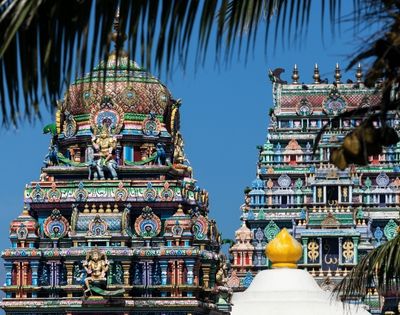








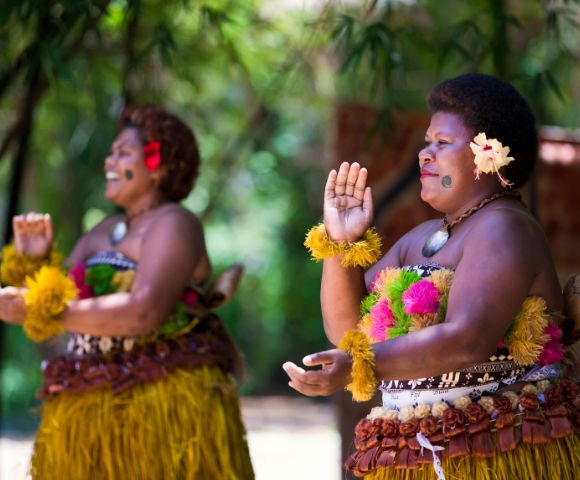

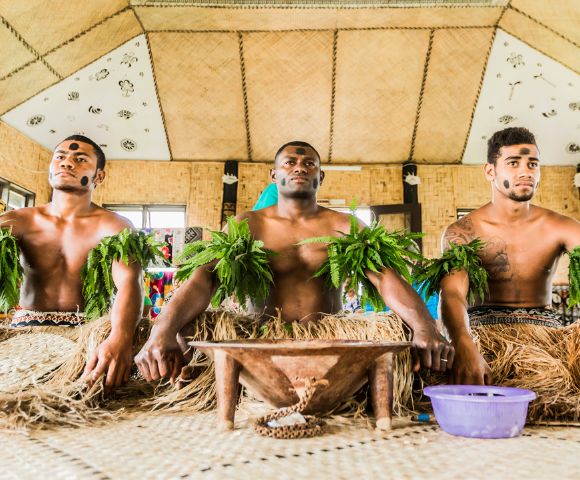
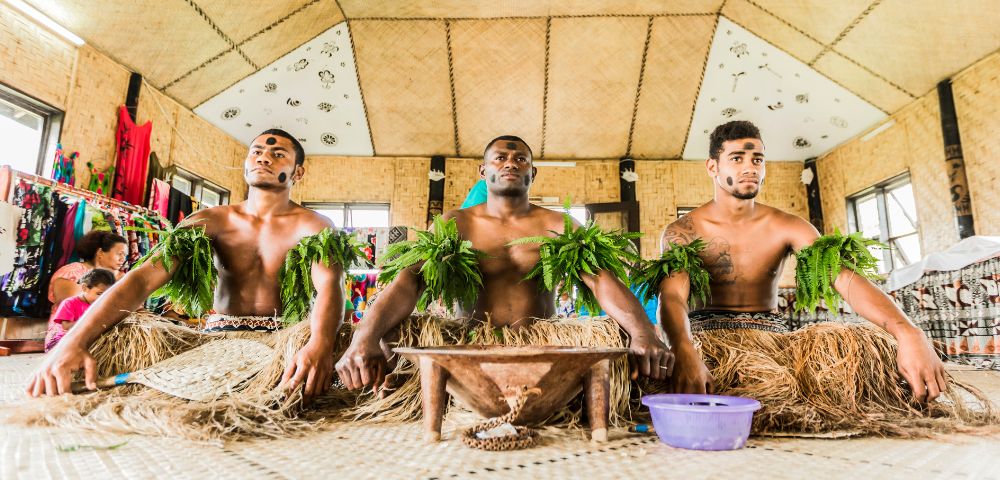
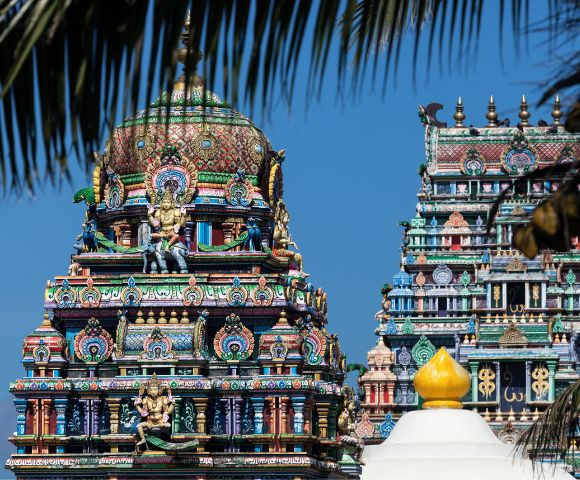



Your Guide to the History and Culture of Fiji
With a storied history and rich culture shaped by Melanesian, European and Indian influences, Fiji is a fascinating destination to visit.
If you wish to learn more before your holiday, here is our guide to the intriguing history and culture of Fiji:
Fiji History
Once known as the ‘Cannibal Isles’ by early European explorers, Fiji has a fascinating history that has influenced the warm and welcoming culture we know and love today. Here is a very brief overview of Fiji’s history:
Early Fiji History
The first inhabitants of Fiji came from Melanesia, who arrived some 3,500 years ago and established a hierarchal society based on clans. At this time, most of the population lived in the southeast of the main island, Viti Levu, where the land was most fertile. However, little is known of the islander’s history before the arrival of Europeans in the mid-17th century.
European Rule in Fiji
Although Europeans first passed by the Fijian Islands in 1643, it wasn’t until 1792 that English Captain William Blough set foot in the region. Other European states quickly sought commercial interest in the islands, attracted by the fertile space that was primed for cotton plantations.
After decades of violent disputes between foreign European powers and the indigenous Fijian communities, Fiji yielded power to the British and become a crown colony in 1874. During British rule, thousands of workers from India were imported to develop a plantation economy, accounting for the diverse ethnic mix of Fiji today.
Modern Fiji
In 1966, the British introduced a new constitution that protected Fijian land rights, gave Fijian chiefs a veto in political matters and introduced an electoral system in which voters were classified according to their ethnicity. A few years later, in 1970, Fiji became a fully sovereign and independent nation.
From independence onwards, Fiji has undergone extensive political changes. This includes several coup d’états, expulsion from the Commonwealth of Nations, the adoption of two new constitutions and, finally, the readmittance into the Commonwealth.
Fiji Culture
Fijian culture has evolved throughout the nation’s history, being shaped by influences from Melanesia, Polynesia, Europe, India and beyond. With family and community at the forefront, the Fijian people are exceedingly warm and friendly, and love to express their love of life with the infectious, enthusiastic and ubiquitous ‘Bula!’.
Today, the Fijian people live a slow-paced lifestyle, affectionately referred to as ‘Fiji Time’. When you visit Fiji, expect time to slow down, as you stop rushing and enjoy the now. Here is a brief overview of what defines Fiji’s rich culture:
Fiji Religion
As a multicultural, multiracial country, a range of different religions are practised in Fiji, including Christianity, Hinduism and Islam. Religion tends to be split along ethnic lines, with most Indigenous Fijians practising Christianity and most Indo-Fijians practising either Hinduism or Islam.
As you explore the Fijian Islands, you’ll come across Christian churches, Sikh and Hindi temples and Islamic mosques. For an insight into Fijian village culture and the importance of family within the community, we recommend attending a Sunday service, even if you aren’t religious yourself.
Fijian Cuisine
The cuisine of Fiji is a direct reflection of the nation’s multiculturalism. Most traditional dishes are centred around a few staple ingredients that are readily available on the islands, including taro, cassava, sweet potato, rice, coconut and breadfruit. Of course, as a South Pacific island nation, Fiji is also blessed with an abundance of fresh seafood, including fish, octopus and shellfish. While visiting Fiji, be sure to try the national dish of Kokoda – a delicacy of raw fish marinated in coconut cream, onion, tomato and lime.
Plus, with a vibrant Indo-Fijian community, there are plenty of Indian influences in Fiji’s cuisine. Expect curries and spices mixed with island flavours like coconut milk, creating a unique fusion cuisine you won’t find anywhere else.
Fijian Ceremonies
Fiji is famous for its cultural ceremonies, which offer a great way for visitors to engage in the local way of life. The three main Fijian ceremonies include the Lovo, the Meke and the Yaqona (Kava).
The Lovo ceremony is a traditional feast, during which fish, meat and vegetables are wrapped in banana leaves and cooked in a makeshift underground oven with hot stones. Not only does this impart unique flavours to the food, but the ceremony also works to bring together communities.
The Meke ceremony uses traditional song and dance to tell local legends of love, history and the spirit of the Fijian islands. During these ceremonies, the orchestra (Vakatara) sing, chant and play percussion instruments for the dancers (Matana) to perform. All performers wear garlands of flowers, while the men don full warrior costumes.
Kava is the national drink of Fiji. Made from the pulverised root of a pepper shrub, kava is traditionally served as part of a ceremony, most commonly when welcoming guests into a local village. During a kava ceremony, guests will sit in a circle around the communal kava bowl, which will be placed in front of the village chief. Once the kava plant is pounded and ready for drinking, the chief will down the first cup before visitors are invited to have a taste.
Arts and Crafts in Fiji
Arts and crafts also play a large role in traditional Fijian culture. Men and women alike create handicrafts like woven baskets, mats, and carved wooden figures, which can be purchased by visitors at local markets and wharves. Of course, these artifacts are not just made for the tourist trade, but also local use and traditional ceremonies.
The weaving materials used in Fijian handicrafts include coconut and pandanus leaves, the taming of which takes a surprising amount of work. Additionally, Fijian tapa cloth is fashioned out of the bark of the mulberry tree, which has been softened through a process of soaking and beating. Purchase a locally-made handicraft on your Fiji holiday to take a piece of the local culture home with you.
Ready to explore beautiful Fiji? To learn more about our unbeatable holiday packages, contact our Fiji Holiday Experts or start browsing our range of Fiji hot deals.
Information sourced from various sources, including Tourism Fiji, Britannica and World Travel Guide.
